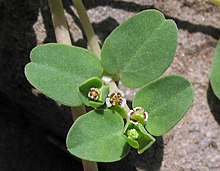Euphorbia serpens is a species of Euphorbia known by the common name matted sandmat. It is native to South America but it can be found on most continents as an introduced species and often a weed.[2] This is an annual herb forming a mat of prostrate stems which root at nodes where the stem comes in contact with the ground. The oval leaves occur in oppositely arranged pairs, each leaf less than a centimeter long. The inflorescence is a cyathium with scalloped white petal-like appendages surrounding the actual flowers. A red nectar gland is at the base of each appendage, and at the center of the cyathium are several male flowers around one female flower. The fruit is a lobed, spherical capsule.
| Euphorbia serpens | |
|---|---|

| |
| Scientific classification | |
| Kingdom: | Plantae |
| Clade: | Tracheophytes |
| Clade: | Angiosperms |
| Clade: | Eudicots |
| Clade: | Rosids |
| Order: | Malpighiales |
| Family: | Euphorbiaceae |
| Genus: | Euphorbia |
| Species: | E. serpens
|
| Binomial name | |
| Euphorbia serpens | |
| Synonyms | |
|
Chamaesyce serpens | |
References
edit- ^ NatureServe (2024). "Euphorbia serpens". Arlington, Virginia. Retrieved 10 April 2024.
- ^ Flora of Zimbabwe
